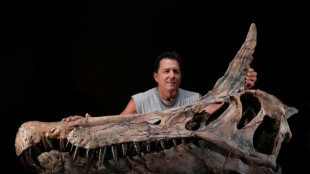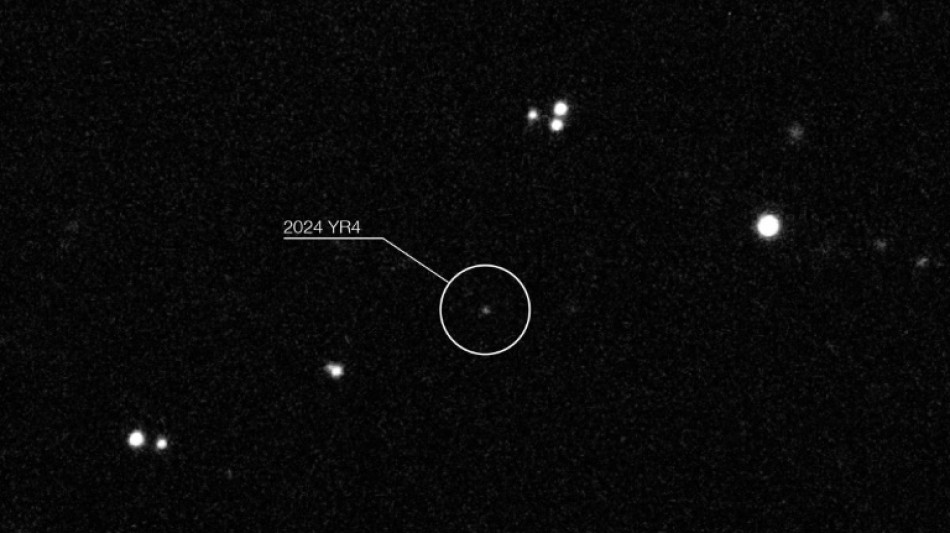
-
 In Iran attack, Trump seeks what he foreswore -- regime change
In Iran attack, Trump seeks what he foreswore -- regime change
-
Climate change forces facelift for Michelangelo masterpiece

-
 Trump says US aims to destroy Iran's military, topple government
Trump says US aims to destroy Iran's military, topple government
-
Acosta wins season-opening MotoGP sprint after Marquez penalty

-
 US and Israel launch strikes against Iran
US and Israel launch strikes against Iran
-
Afghanistan says Pakistan fighter jet down as cross-border strikes flare
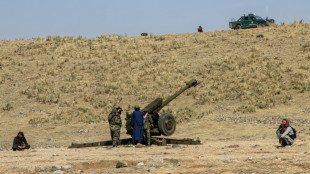
-
 Kerr says only '85 percent' fit for Women's Asian Cup
Kerr says only '85 percent' fit for Women's Asian Cup
-
Messi's Inter Miami to visit White House: US media

-
 Thunder beat Nuggets in overtime on Gilgeous-Alexander's return
Thunder beat Nuggets in overtime on Gilgeous-Alexander's return
-
'It's surreal': Zimbabwe superfans revel in unexpected ride to India

-
 New 'Wuthering Heights' film unleashes fresh wave of Bronte-mania
New 'Wuthering Heights' film unleashes fresh wave of Bronte-mania
-
US backs Pakistan's 'right to defend itself' after strikes on Afghanistan
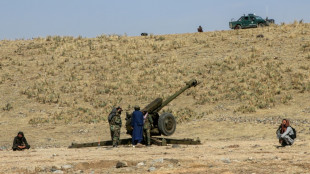
-
 Bezzecchi beats Marquez to pole at season-opening Thailand MotoGP
Bezzecchi beats Marquez to pole at season-opening Thailand MotoGP
-
OpenAI strikes Pentagon deal with 'safeguards' as Trump dumps Anthropic

-
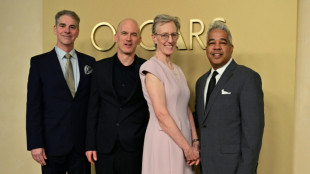 Oscar-nominated 'F1' sound engineers recreate roar of racetrack
Oscar-nominated 'F1' sound engineers recreate roar of racetrack
-
15 dead as cash-packed military plane crashes in Bolivia
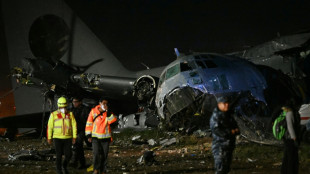
-
 Costa Rica's Grynspan pledges reform in bid for UN chief job
Costa Rica's Grynspan pledges reform in bid for UN chief job
-
Former All Black Bridge hailed for influence at Western Force

-
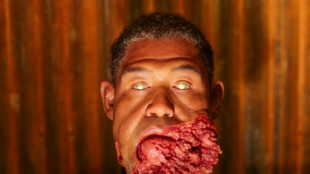 'Sinners' vampires inspired by animals, says Oscar hopeful makeup artist
'Sinners' vampires inspired by animals, says Oscar hopeful makeup artist
-
For Oscar nominee Stellan Skarsgard, good cinema is like slow food

-
 'Brilliant industry' sees Reds down Highlanders in Super Rugby
'Brilliant industry' sees Reds down Highlanders in Super Rugby
-
Neil Sedaka, US singer and songwriter, dies age 86

-
 Paramount acquires Warner Bros. in $110 bn mega-merger
Paramount acquires Warner Bros. in $110 bn mega-merger
-
Rosenior eyes extended stay to stabilise Chelsea

-
 Spurs struggling physically admits Tudor
Spurs struggling physically admits Tudor
-
Lens held by Strasbourg in blow to Ligue 1 title chances

-
 NFL salary cap passes $300 mn for first time
NFL salary cap passes $300 mn for first time
-
Wolves secure rare win to dent Villa's bid for Champions League place

-
 Oil prices jump on Iran attack fears while US stocks fall
Oil prices jump on Iran attack fears while US stocks fall
-
Two dead, dozens injured as tram derails in Milan

-
 Trump tells US govt to 'immediately' stop using Anthropic AI tech
Trump tells US govt to 'immediately' stop using Anthropic AI tech
-
Court orders Greenpeace to pay $345 mn to US oil pipeline company

-
 IAEA stresses 'urgency' to verify Iran's nuclear material
IAEA stresses 'urgency' to verify Iran's nuclear material
-
UN urges action to prevent full civil war in South Sudan

-
 Hackers steal medical details of 15 million in France
Hackers steal medical details of 15 million in France
-
Susan Sarandon praises Spain’s stance on Gaza

-
 Murray adamant size isn't everything despite losing Wales place
Murray adamant size isn't everything despite losing Wales place
-
Messi knocked down by fan in Puerto Rico pitch invasion

-
 Two killed, dozens injured as tram derails in Milan
Two killed, dozens injured as tram derails in Milan
-
O'Neill taken aback by Rangers boss Rohl's comments on Celtic

-
 Ukrainian, Slovak leaders hold call amid energy spat
Ukrainian, Slovak leaders hold call amid energy spat
-
French hard-left firebrand sparks row with 'antisemitic' Epstein jibe

-
 Ahmed, Jacks blast England to thrilling win over New Zealand
Ahmed, Jacks blast England to thrilling win over New Zealand
-
UK police arrest man after Churchill statue sprayed with graffiti

-
 Bill Clinton denies wrongdoing at grilling on Epstein ties
Bill Clinton denies wrongdoing at grilling on Epstein ties
-
Red Cross urges Afghanistan-Pakistan 'de-escalation'

-
 Coup role revelations revive calls for return of Spain's ex king
Coup role revelations revive calls for return of Spain's ex king
-
Oil prices jump on Iran attack fears, Wall Street slips on AI

-
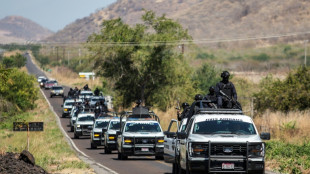 TikTok disinformation: the other weapon in Mexico violence
TikTok disinformation: the other weapon in Mexico violence
-
Carmaker BMW to trial humanoid robots at German factory
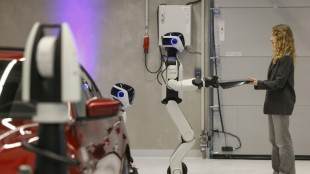

Earth's satellites at risk if asteroid smashes into Moon: study
If a huge asteroid smashes into the Moon in 2032, the gigantic explosion would send debris streaming towards Earth that would threaten satellites and create a spectacular meteor shower, according to researchers.
Earlier this year there were briefly fears that the 60-metre-wide (200-foot-wide) asteroid called 2024 YR4, which is big enough to level a city, would strike Earth on December 22, 2032.
It was given the highest chance -- 3.1 percent -- of hitting our home planet that scientists have ever measured for such a giant space rock.
Subsequent observations from telescopes definitively ruled out a direct hit on Earth.
However, the odds that it will crash into the Moon have risen to 4.3 percent, according to data from the James Webb space telescope in May.
A new preprint study, which has not been peer-reviewed, is the first to estimate how such a collision could affect Earth.
It would be the largest asteroid to hit the Moon in around 5,000 years, lead study author Paul Wiegert of Canada's University of Western Ontario told AFP.
The impact would be "comparable to a large nuclear explosion in terms of the amount of energy released", he added.
Up to 100 million kilograms (220 million pounds) of material would shoot out from the Moon's surface, according to a series of simulations run by the researchers.
If the asteroid hit the side of the Moon facing Earth -- which is roughly a 50-percent chance -- up to 10 percent of this debris could be pulled in by Earth's gravity over the following days, they said.
- 'Like a bullet' -
Earth's atmosphere would protect the surface from the millimetre- to centimetre-sized lunar rocks, Weigert said. 0.04-2.54
But these meteors could be capable of destroying some satellites -- and there are expected to be a lot more of those orbiting the planet by 2032.
"A centimetre-sized rock travelling at tens of thousands of metres per second is a lot like a bullet," Wiegert said.
In the days after the impact, there could be more than 1,000 times the normal number of meteors threatening Earth's satellites, he added.
Meanwhile, those of us on the ground would be treated to a "spectacular" meteor shower lighting up the night sky, the study said.
But the current odds of a direct hit on the near side of the Moon remain at just two percent, Wiegert emphasised.
The asteroid is not expected to be visible again until 2028, so the world will have to wait to find out more.
If a direct hit is eventually found to be likely, humanity probably has enough time to plan a mission to spare the Moon.
"I'm sure it will be considered," Wiegert said.
The asteroid is half as wide and has 10 percent of the mass of Dimorphos, which NASA's DART mission smashed into in 2022, successfully changing its trajectory.
If 2024 YR4 is on a collision course with the Moon, it would be "a good target" for another test of our planetary defences, Wiegert said.
But if not, trying to deflect something zooming so close to Earth could be a little "dangerous", he added.
The preprint study, which published on the arXiv database last week, has been submitted to the Astrophysical Journal Letters.
F.Dubois--AMWN

